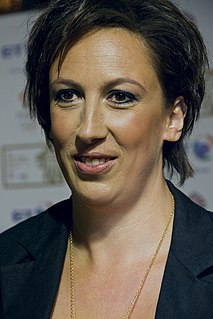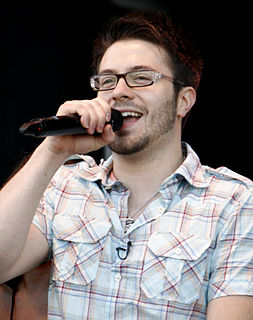A Quote by Sarah Waters
Cut like crazy. Less is more. I've often read manuscripts - including my own - where I've got to the beginning of, say, chapter two and have thought: “This is where the novel should actually start.” A huge amount of information about character and backstory can be conveyed through small detail. The emotional attachment you feel to a scene or a chapter will fade as you move on to other stories. Be business-like about it.
Quote Topics
Related Quotes
If God is an author and the universe is the biggest novel ever written, I may feel as if I'm the lead character in the story, but like every man and woman on Earth, I am a suporting player in one of billions of subplots. You know what happens to supporting players. Too often they are killed off in chapter 3, or in chapter 10, or in chapter 35. A supporting player always has to be looking over his shoulder.
If Mother Culture were to give an account of human history using these terms, it would go something like this: ' The Leavers were chapter one of human history -- a long and uneventful chapter. Their chapter of human history ended about ten thousand years ago with the birth of agriculture in the Near East. This event marked the beginning of chapter two, the chapter of the Takers. It's true there are still Leavers living in the world, but these are anachronisms, fossils -- people living in the past, people who just don't realize that their chapter of human history is over. '
I read Herman Hesse's 'Siddhartha' while I was writing 'Lord of Light' along with many other things. It seemed a good time to read it so I could see what he had to say about Buddha. In my first chapter, I was thinking in terms of the big battle scene in the 'Mahabarata.' It helped me in visualizing the battle in my novel.
I'm more or less happily writing Chapter Six of The Graveyard Book. I say more or less as I'm at that place where I hope that the book knows what it's doing because right now I don't have a clue - I'm writing one scene after another like a man walking through a valley in thick fog, just able to see the path a little way ahead, but with no idea where it's actually going to lead him.
What I do usually is read the book first, for pleasure, to see if my brain starts connecting with it, as a movie. And then, if I say yes, I read it again, only this time I take a pen and, inside the book, I say, "Okay, this is a scene. I don't need this. I'm going to try this. I'm not going to take this." And then, I use that book like a bible and each chapter heading, I write a menu of what's in that chapter, in case I ever need to reference it. And then, I start to outline and write it. I get in there and it starts to evolve, based on having re-read it again.
I would look at the first chapter of any new novel as a final test of its merits. If there was a murdered man under the sofa in the first chapter, I read the story. If there was no murdered man under the sofa in the first chapter, I dismissed the story as tea-table twaddle, which it often really was.
I do not begin my novel at the beginning, I do not reach chapter three before I reach chapter four, I do not go dutifully from one page to the next, in consecutive order; no, I pick out a bit here and a bit there, till I have filled all the gaps on paper. This is why I like writing my stories and novels on index cards, numbering them later when the whole set is complete. Every card is rewritten many times.
Writers block: when I get it, it's because my subconscious spotted that I'd make a huge structural mistake in constructing a novel before my conscious mind became aware of it, and threw on the brakes. So I've learned not to sweat it: take two days off, then back up a chapter, read through, and try to work out why I'm suddenly uneasy about continuing.






































